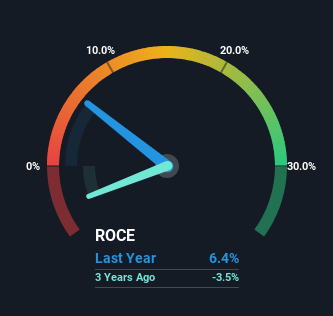- Hong Kong
- /
- Consumer Durables
- /
- SEHK:146
Tai Ping Carpets International (HKG:146) Shareholders Will Want The ROCE Trajectory To Continue
If we want to find a stock that could multiply over the long term, what are the underlying trends we should look for? Typically, we'll want to notice a trend of growing return on capital employed (ROCE) and alongside that, an expanding base of capital employed. This shows us that it's a compounding machine, able to continually reinvest its earnings back into the business and generate higher returns. So when we looked at Tai Ping Carpets International (HKG:146) and its trend of ROCE, we really liked what we saw.
What Is Return On Capital Employed (ROCE)?
Just to clarify if you're unsure, ROCE is a metric for evaluating how much pre-tax income (in percentage terms) a company earns on the capital invested in its business. The formula for this calculation on Tai Ping Carpets International is:
Return on Capital Employed = Earnings Before Interest and Tax (EBIT) ÷ (Total Assets - Current Liabilities)
0.064 = HK$31m ÷ (HK$755m - HK$270m) (Based on the trailing twelve months to December 2022).
So, Tai Ping Carpets International has an ROCE of 6.4%. Ultimately, that's a low return and it under-performs the Consumer Durables industry average of 8.6%.
Check out our latest analysis for Tai Ping Carpets International

While the past is not representative of the future, it can be helpful to know how a company has performed historically, which is why we have this chart above. If you're interested in investigating Tai Ping Carpets International's past further, check out this free graph of past earnings, revenue and cash flow.
So How Is Tai Ping Carpets International's ROCE Trending?
Shareholders will be relieved that Tai Ping Carpets International has broken into profitability. The company was generating losses five years ago, but has managed to turn it around and as we saw earlier is now earning 6.4%, which is always encouraging. Interestingly, the capital employed by the business has remained relatively flat, so these higher returns are either from prior investments paying off or increased efficiencies. With no noticeable increase in capital employed, it's worth knowing what the company plans on doing going forward in regards to reinvesting and growing the business. So if you're looking for high growth, you'll want to see a business's capital employed also increasing.
In Conclusion...
To sum it up, Tai Ping Carpets International is collecting higher returns from the same amount of capital, and that's impressive. And since the stock has fallen 52% over the last five years, there might be an opportunity here. With that in mind, we believe the promising trends warrant this stock for further investigation.
One more thing to note, we've identified 2 warning signs with Tai Ping Carpets International and understanding these should be part of your investment process.
If you want to search for solid companies with great earnings, check out this free list of companies with good balance sheets and impressive returns on equity.
Valuation is complex, but we're here to simplify it.
Discover if Tai Ping Carpets International might be undervalued or overvalued with our detailed analysis, featuring fair value estimates, potential risks, dividends, insider trades, and its financial condition.
Access Free AnalysisHave feedback on this article? Concerned about the content? Get in touch with us directly. Alternatively, email editorial-team (at) simplywallst.com.
This article by Simply Wall St is general in nature. We provide commentary based on historical data and analyst forecasts only using an unbiased methodology and our articles are not intended to be financial advice. It does not constitute a recommendation to buy or sell any stock, and does not take account of your objectives, or your financial situation. We aim to bring you long-term focused analysis driven by fundamental data. Note that our analysis may not factor in the latest price-sensitive company announcements or qualitative material. Simply Wall St has no position in any stocks mentioned.
About SEHK:146
Tai Ping Carpets International
Engages in the design, manufacture, import, export, and sale of carpets in Asia, Europe, the Middle East, the United States, and Africa.
Flawless balance sheet with proven track record.
Market Insights
Community Narratives



